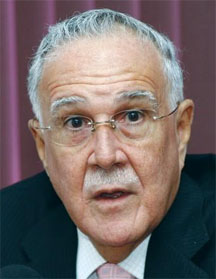(Trinidad Express) Chief Justice Ivor Archie and Court of Appeal Judge Wendell Kangaloo continue to face mounting pressure following their decision to accept appointments to the rank of Senior Counsel while serving as members of the Judiciary.

Former attorney general Karl Hudson-Phillips and former chief justice Michael de la Bastide have been critical of the decision of Archie and Kangaloo to accept the honour. Hudson-Phillips even went as far as to suggest the title should be handed back forthwith.
The Council of the Law Association, headed by Senior Counsel Dana Seetahal, will meet today in an emergency session at 3.30 p.m. at its headquarters to discuss the issue.
The latest person to speak out against the appointments is Senior Counsel Martin Daly who described the situation as “quite shocking”.
Daly was speaking on the TV6’s Morning Edition programme with host Fazeer Mohammed yesterday. He said there are many things wrong about the appointments and spoke of great disquiet among legal practitioners on the issue.
Archie and Kangaloo were among 16 attorneys, including Attorney General Anand Ramlogan, Prime Minister Kamla Persad-Bissessar, Director of Public Prosecutions Roger Gaspard and Solicitor General Eleanor Donaldson-Honeywell, to be conferred with the title last Friday.
The appointments were proposed by Ramlogan and agreed to by Persad-Bissessar who then informed the Office of the President following consultation with the Law Association and Archie.
Archie said on Friday: “It’s as much a mystery to you as to me as to how my name was put forward.”
He said he did not apply for Senior Counsel rank even though he discussed with Ramlogan the names of those to whom silk should be given. Archie said it was good to know that the body of work he contributed had been recognised.
He has, however, declined to comment further on the brewing controversy. Daly, however, said it is wrong to give a judge an appointment which relates to being a practising lawyer “or lawyer of another species”.
“It is just patently absurd on the face of it,” Daly said.
“As the system works at the moment, the appointment is effectively made by the Government and one can be sure its just really the Prime Minister and the Attorney General that decides on it. It is quite shocking that sitting members of the Judiciary should be accepting awards or appointments from the Executive.”
Daly said the question arises as to whether the Judiciary is maintaining the constitutionally-enshrined separation and distance it ought to maintain from the Executive. “The fundamental issue is, Judges should not be accepting discretionary appointments or awards from the Executive once they put their judicial backsides on the bench.
“If its an application process and the appointment is open to judges, which of course I say it should not, then what about the other judges? Did other judges apply and get turned down? Was it known to the Judiciary that appointments to Senior Counsel were going to be open to judges? So procedurally as well, it smells.
“If there is a settled practice, which there is, that upon your appointment as Chief Justice you are given, usually, the highest national award, that is okay because you are following a settled practice. It isn’t something you have applied for.
“I would be quite interested to have the Attorney General tell us the dates of the applications of every single one of these people.
But the feeling among the profession and, as you see, very eminent people like Mr De la Bastide and Mr Hudson-Phillips, has to do with the awards to the Judges. I have many things to say about the others because a lot of good people who got this award are getting tarnished. They are becoming, to use one of my favourite terms, collateral damage.”
Daly said he is generally satisfied that the separation of powers between the Judiciary and Executive has been maintained in the past. “This is driving a donkey cart through the whole Judicial distance.
“This is not just lawyers fighting among themselves. This is a deal that has been made between the Judiciary and the Executive and the common man should be concerned about that.”
He said the Judiciary as a body needs to meet to decide on the way forward.
“In one case they (commentators) are talking about returning the appointment. That is not for me to say. But it is clearly an option to satisfy the disquiet.”
On Monday, Hudson-Phillips, in a letter to the editor, said the award of silk should be limited to practising advocates who have distinguished themselves at the Bar and not for lawyers who have distinguished themselves in other areas of public service not connected with the law.
Hudson-Phillips said it was only in the recent past that there was any deviation from that unwritten rule and suggested that the time has come for the procedure and criteria for awarding silk to be reviewed.
His views were shared by De la Bastide who said, also in a letter to the editor, that the situation has the potential to cause much embarrassment among Commonwealth counterparts and provide a possible source of amusement over what is “an obvious gaffe”.








